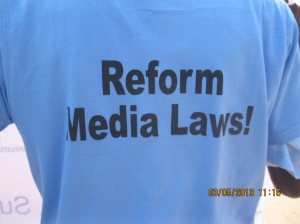 |
| On World Press Freedom Day 2013, Mr Grey-Johnson accused Gambian media of “reporting negatively” about the country, which according to him, is driving away investors (Photo credit: Modou S. Joof/TNBES/Globe/FPI). |
The Gambia’s Minister of Information Nana Grey-Johnson has been axed by President Yahya Jammeh on Tuesday, four months after he presided over the enactment of a widely-condemned internet law.
Typical of the regime, a news release broadcast on
State-TV on November 26 indicated Mr Grey-Johnson’s sacking with
immediate effect, without further explanation. His replacement is yet to
be announced, Mr Jammeh had in the past had the ministry under his
office.
Grey-Johnson, a veteran journalist, shocked the media
fraternity in The Gambia and international rights groups on July 3, 2013
when he presided over parliament’s enactment of an adjusted version of
the 2009 Information and Communication Act.
The Information and Communication (amendment)
Act 2013 severely restricts press freedom, the right to freedom of
expression on the internet, criminalises online speech, encourages
self-censorship and violates the public’s right to know.
The amended Act specifies that a person commits a
criminal offence if he or she uses the internet to spread false news
against the government, incite dissatisfaction or instigate violence
against the government, caricature, abuse or make derogatory statements
against public officials.
Under the law, offenders will be jailed up to 15 years or fined an amount of three million Dalasi (about US$100,000).
It came at the back of claims by Minister Grey-Johnson
that “In the recent past, some citizens have waged concerted efforts to
pit the people and the security officials of The Gambia against their
Government.”
“They do this by inciting the people to engage in
unpatriotic behaviour, spreading false news and engaging in criminal
defamation against Government officials,” he said.
 |
Local
journalists in Banjul have called for a Reform of Media Laws on World
Press Freedom Day 2013 (Photo Credit: Modou S. Joof/Globe/FPI)
|
Rights groups react
The Media Foundation for West Africa, MFWA, said it is “alarmed” by the amendments “aimed at imposing stiffer punishments and stifling freedom of expression online”.
The Government intends to use this law to silence
critical Gambian internet users, online activists, online newspapers and
bloggers within or without the country, according to the MFWA.
The free press and free expression agency, Reporters Without Borders, RSF, has said it is very disturbed by The Gambia’s new Information and Communication (amendment)Act 2013 – which imposes lengthy jail term and heavy fines for persons “spreading false news” on the internet.
Another watchdog Amnesty International said the new
bill takes the restriction of freedom of expression in The Gambia to a
“shocking new level”.
Both agencies have criticized
the passing of the new law by The Gambia, a tiny West African country
where media laws have since been described as “draconian”.
The International Federation of Journalists (IFJ) and its pan-African media grouping, the Federation of African Journalists (FAJ), have described the internet law as “the Over-Criminalising Media Bill in The Gambia”.
Not safe to misspeak
ARTICLE 19, which has previously
analysed several provisions of the Gambian Criminal Code and found that
they are in violation of international standards on freedom of
expression, has condemned the internet law saying it “furthers Government crackdown on freedom of expression.”
Invited by Gambia Press Union on World Press Freedom Day 2013 to address pertinent issues
like reform of draconian media laws, the need for a freedom of
information law and the arbitrary closure of independent media houses,
Grey-Johnson accused the media of “reporting negatively” about the
country, which according to him, is driving away investors.
Speaking on the topic “Safe to Speak: Securing Freedom of Expression in All Media”, he said “it is safe to speak, it is not to misspeak.”
 |
| Voice over Internet Protocol, how it works (Photo credit: Wikipedia) |
VoIP ban
Grey-Johnson who was appointed in March this year supported the registration of internet cafés and the band on the commercialisation of Voice over Internet Protocol (VoIP) services.
The Ministry of Information and Communications Infrastructure stated: “PURA have found it necessary to draw the attention of all operators of internet cafés of the criminal act that deprives registered internet service providers of revenue vital to their operations and to the revenue of the national treasury.”
A statement from PURA in May had stated “Internet café operators in The Gambia must register with the Public Utilities Regulatory Authority, PURA, if they are to continue in business.”
The new directive followed PURA’s April 19 order that banned companies and individual internet café operators from “offering dating and VoIP services like Skype or Viper as a “commercially available service” to Gambians.
However, the Dakar-based Article19 West Africa said: “The fact that the use of VoIP services is being prohibited in order to benefit phone companies is a concern.” It calls on the PURA to immediately repeal the 19 April order in its entirety.
“Unless the government can demonstrate that this prohibition serves the public interest, the prohibition is likely to strengthen state control of the provision of phone services to the detriment of Internet- based services,” the free expression advocacy agency said.
This story first appeared Here
Written by Modou S. Joof











No comments:
Post a Comment
The views expressed in this section are the authors' own. It does not represent The North Bank Evening Standard (TNBES)'s editorial policy. Also, TNBES is not responsible for content on external links.